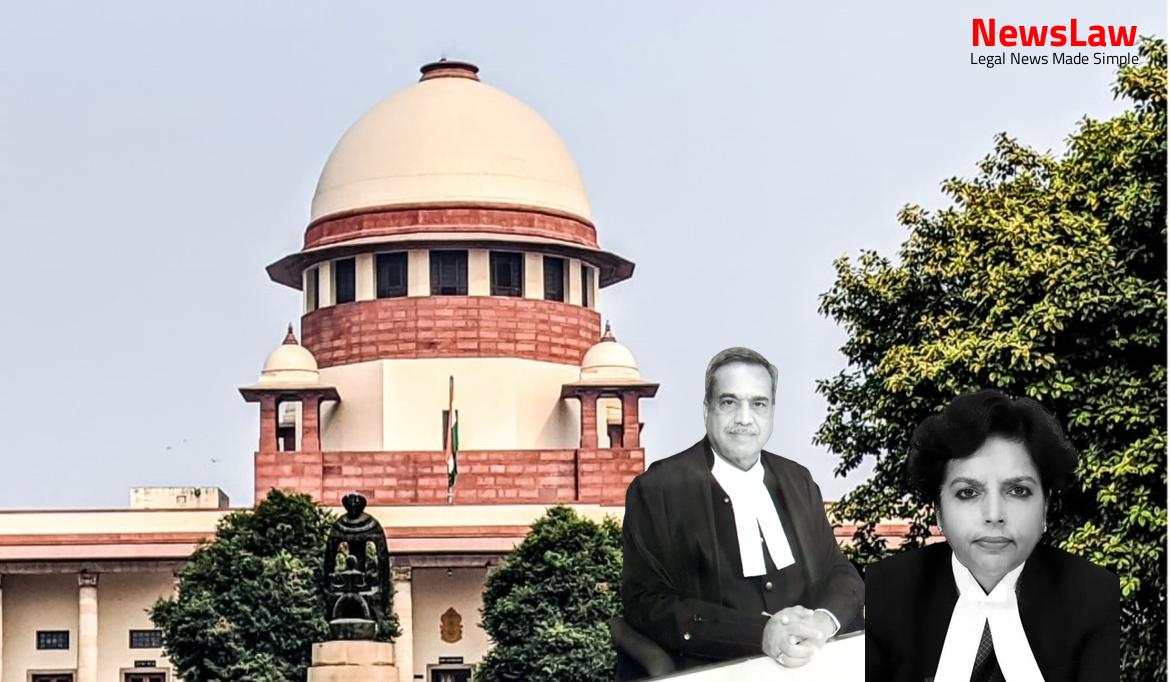Delve into the comprehensive legal examination of the Registration Act provisions undertaken by the court in a recent case. The analysis focused on critical sections such as 32, 33, and 35 to determine the validity of document registration and the role of the Registering Officer in preventing fraud. Stay tuned to unravel the complexities of the law in action.
Facts
- The second defendant had a certified copy of the special power of attorney which required registration.
- An exhibit dated 02.07.1987 showed the second defendant agreed to pay Rs.30,000 to the plaintiff, conflicting with the cancellation of the power of attorney on 02.02.1987.
- The plaintiff authorized the second defendant to sell the property for Rs.55,000, although the consideration amount was denied.
- The cancellation of the special power of attorney was deemed in the eye of the law since it was handed over to the plaintiff.
- The sale deed execution required Rs.20,000 to be received on registration as immediate effecting was not possible.
- The second defendant was alleged not to be competent to execute the sale deed by the plaintiff.
- The power of attorney cancellation was disputed, with evidence from DW4 and a letter DX dated 02.06.1987.
- Section 18A of the Registration Act was cited in relation to the registration of the sale deed with the power of attorney.
- The negotiation of the sale did not proceed fully, and the defendant No.2 was said to be not competent for sale execution.
- Court fee of Rs.19.50 correctly fixed.
- Relief of declaration by way of permanent injunction denied due to plaintiff not being owner in possession.
- Suit for rendition of accounts from the second defendant was decreed.
- Alleged cancellation of power of attorney not given weight as second defendant possessed certified copy of registered special power of attorney.
Also Read: Judicial Analysis on Back Wages in Employee Caste Verification Case
Issue
- The court framed several key legal questions for consideration.
- The court discussed issues related to the cancellation of the power of attorney and its impact on the sale deed.
- There was a focus on the compliance with mandatory provisions of the Registration Act.
- The validity of the sale deed and the entitlement of the plaintiff to relief were central to the discussion.
- Rebuttal of presumption and the appropriate relief for the plaintiff were also addressed.
Also Read: Interpretation of Suspension Rules in Employment Case
Arguments
- The first defendant admitted entering into an oral agreement to purchase the property for Rs.30,000 and not Rs.55,000 as claimed by the plaintiff.
- It is denied that the first defendant could not arrange for the money as alleged by the plaintiff.
- The first defendant argued that he was not obligated to produce the original power of attorney for a legal presentation of the document.
- The first defendant stated that the actual place of posting of the plaintiff, who is a junior engineer, was not known to him.
- The petitioner relied on judgments from Allahabad High Court and Madras High Court to support their case.
- The plaintiff did not seek cancellation of the sale deed or recovery of possession.
- Reference was made to the Registration Act, 1908, regarding power of attorney to execute a sale deed.
- The terms of the power of attorney indicated that the consideration was not as claimed by the plaintiff.
- The defendant argued that the registration of a document must be cancelled in the same manner and that only a registered document could cancel a registered power of attorney.
- It was noted that Defendant No.1 was put in possession upon executing the sale deed.
Also Read: Legal Analysis of Assignment and Ratification in Property Law
Analysis
- The analysis of the Registration Act is crucial in this case.
- Section 32 and Section 33 are highlighted as relevant provisions.
- Section 18A is discussed regarding the production of true copies of documents for registration.
- The distinction between persons executing documents under Section 32(a) and power of attorney holders under Section 32(c) is emphasized.
- The necessity of presenting documents by the actual executant is outlined.
- The impact of Section 18A on the registration process is evaluated.
- The role of the power of attorney holder in presenting documents and the recognition of different kinds of power of attorney under the Act is explained.
- The significance of Section 35 on the procedure of admission or denial of execution is highlighted.
- Section 32 specifies three categories of persons eligible to present documents for registration
- The terms of Sections 32 and 33 of Act III of 1877 are considered imperative
- A presentation of a document for registration by an agent without proper authorization is not valid
- The jurisdiction of the Sub-Registrar comes into force only when a document is presented in accordance with the law
- The purpose of Sections 32, 33, 34, and 35 of Act III of 1877 is to prevent fraud through registration
- Section 35(2) gives the Registering Authority the authority to verify the identity of persons appearing before him for registration purposes.
- In cases where all required persons do not appear due to urgent circumstances, the Registrar may allow registration with a fine not exceeding ten times the registration fee.
- Section 58 outlines the requirements for the registration of documents related to property sales, including the signatures of all relevant parties.
- Sections 71, 72, and 77 provide for reasons for refusal to register, appeals to the Registrar, and the option to file a suit within 30 days against refusal, respectively.
- The Punjab Bill aimed to streamline the document registration process to reduce delays and errors.
- Sections 32, 33, and 34 detail the requirements for presenting documents for registration and the role of the Registering Officer in verifying identities.
- Power-of-attorney regulations in Section 32 specify the acceptable forms of authorization for document registration.
- Section 208 outlines when the termination of an agent’s authority takes effect and must be taken into consideration during registration.
- The Registering Officer has the authority under Section 35 to refuse registration if there are disputes regarding execution or if the person is incapacitated or deceased.
- Documentation requirements and procedures for registration are detailed in sections 58 and 18-A.
- The Registering Officer is responsible for ensuring compliance with registration procedures and verifying the authenticity of presented documents.
- The power of attorney does not contain any restriction on the price of the property to be sold.
- The absence of a specific price restriction in the power of attorney is evident upon examination.
- Therefore, the duty of the second defendant to not sell below a certain price cannot be enforced if not explicitly mentioned in the power of attorney.
- The sale of the property for Rs.30,000 by the second defendant, despite a supposed duty to not sell below Rs.55,000, does not invalidate the sale or make it null and void.
Decision
- The appellant appoints Sh. Yash Pal Singh as the Special Power of Attorney to sell the land.
- Sh. Yash Pal Singh is authorized to sell the land to anyone at any price, prepare the sale deed, and present it to the Sub Registrar.
- The impugned Judgment is not sustainable and is set aside.
- The appeal is allowed.
Case Title: AMAR NATH Vs. GIAN CHAND (2022 INSC 106)
Case Number: C.A. No.-005797-005797 / 2009



